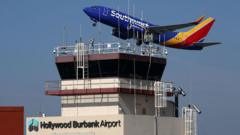In a move that has begun to reshape compensation structures in North America's aviation industry, Air Canada’s flight attendants recently staged a strike with a clear demand: “Unpaid work won’t fly.” The strike, which occurred last week, was rooted in the longstanding practice of not compensating flight attendants for their work on the ground before flights commence.
As the brief strike maneuvered through the chaos of peak summer travel, it garnered public support and attention, especially as a poll suggested widespread awareness among Canadian travelers. Notably, in contrast to airlines in some European countries that offer monthly salaries, many North American airlines, including Air Canada, still rely on an hourly pay model that excludes ground work compensation.
The tentative deal reached on Tuesday between the Canadian Union for Public Employees (CUPE) and Air Canada has yet to be fully disclosed, but insiders indicate it promises a pay increase over the coming years and, for the first time, partial compensation for boarding time and cabin security checks before departure. This development has been hailed by the union as “historic,” signaling an end to the entrenched practice of unpaid labor in aviation.
While the strike was a pivotal moment for Air Canada flight attendants, concerns linger regarding the acceptance of the proposed agreement as many remain dissatisfied. The specter of past practices looms large, especially as other airlines like Air Transat and WestJet share similar compensation structures. Efforts are being made in the industry to address the growing calls for fair treatment amidst negotiations influenced by changing perceptions regarding ground pay.
Experts suggest that this development could lead to a broader industry shift, with other North American airlines likely to follow suit, possibly setting off a wave of similar demands. Among the changes sparked by the pandemic was a reevaluation of how airlines handle ground work, drawing attention to the pressures that have subsequently increased for cabin crews.
With Delta Airlines leading the way in 2022 by introducing payment for pre-flight work, the landscape has evolved faster than many expected, and Air Canada’s recent agreement may position it ahead of its competitors.
Despite the victories, the future of the deal regarding ground pay and further labor negotiations remains uncertain. Opinions vary among workers, especially concerning wages for junior flight attendants. Union leaders reiterate their commitment to fair compensation, hinting at further complexities ahead.
The developments originating from this strike are casting a spotlight on labor rights in Canada, contributing to a significant cultural shift towards recognizing and compensating previously overlooked aspects of airline work. Both Air Transat and WestJet are expected to engage in contract negotiations soon, and experts believe that the establishment of ground pay will be a key point of contention, suggesting the potential for more union victories across the industry.
As public sentiment grows stronger in favor of flight attendant labor rights, the recent strike has become a pivotal point for not only Air Canada but potentially for the entire North American airline industry’s approach towards compensation and worker dignity.






















